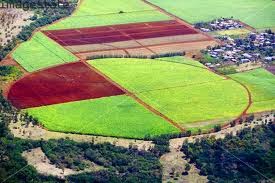Agriculture, forestry, and fishing
 Although the significance of the agricultural sector has diminished with efforts to diversify the economy, it is still important. Sugar production, generating about one-sixth of export earnings, occupies about four-fifths of the total arable land. Tea and tobacco are also cash crops. Subsistence crops include potatoes, tomatoes, and bananas. The livestock population primarily consists of poultry, sheep, goats, pigs, an Forests make up about one-fifth of the total land area of Mauritius. Rapid deforestation occurred during the colonial era, and non-native species were introduced to repopulate the forestland, including the slash pine (Pinus elliottii), which is predominant, Japanese cedar (Cryptomeria japonica), and Moreton Bay pine (Araucaria cunninghamii). Eucalyptus trees and trees that belong to the beefwood (Casuarina) family are also present. Roundwood is the primary forest product, of which some two-fifths is used for fuel; sawn wood is also produced. Mauritius is unique among countries in the region in that it consumes more wood products than it produces and must import the difference.
Although the significance of the agricultural sector has diminished with efforts to diversify the economy, it is still important. Sugar production, generating about one-sixth of export earnings, occupies about four-fifths of the total arable land. Tea and tobacco are also cash crops. Subsistence crops include potatoes, tomatoes, and bananas. The livestock population primarily consists of poultry, sheep, goats, pigs, an Forests make up about one-fifth of the total land area of Mauritius. Rapid deforestation occurred during the colonial era, and non-native species were introduced to repopulate the forestland, including the slash pine (Pinus elliottii), which is predominant, Japanese cedar (Cryptomeria japonica), and Moreton Bay pine (Araucaria cunninghamii). Eucalyptus trees and trees that belong to the beefwood (Casuarina) family are also present. Roundwood is the primary forest product, of which some two-fifths is used for fuel; sawn wood is also produced. Mauritius is unique among countries in the region in that it consumes more wood products than it produces and must import the difference. Technical assistance from Japan and India is regenerating the fishing industry, which has grown in importance. Mauritius’s waters contain many species of fish with commercial value, including tuna, snapper, and grouper. Aquaculture is practiced with such species as channel bass and sea bream.
Technical assistance from Japan and India is regenerating the fishing industry, which has grown in importance. Mauritius’s waters contain many species of fish with commercial value, including tuna, snapper, and grouper. Aquaculture is practiced with such species as channel bass and sea bream.Resources, power, and manufacturing
Mauritius has few viable mineral resources. Basalt and lime are mined. Electricity is largely generated from imported petroleum, with a small percentage derived from hydropower. Sugar plantations often use bagasse—the fibre that remains from sugarcane after sugar-bearing juice is extracted—as fuel to produce electricity.
 There has been a steady increase in manufacturing since the 1970s. The Mauritius Export Processing Zone, which concentrates on labour-intensive processing of imported raw materials or semifinished goods for the export market, has successfully attracted foreign investment. Economically important manufactures include textiles, food processing, metal and metal products, and chemical products.
There has been a steady increase in manufacturing since the 1970s. The Mauritius Export Processing Zone, which concentrates on labour-intensive processing of imported raw materials or semifinished goods for the export market, has successfully attracted foreign investment. Economically important manufactures include textiles, food processing, metal and metal products, and chemical products.